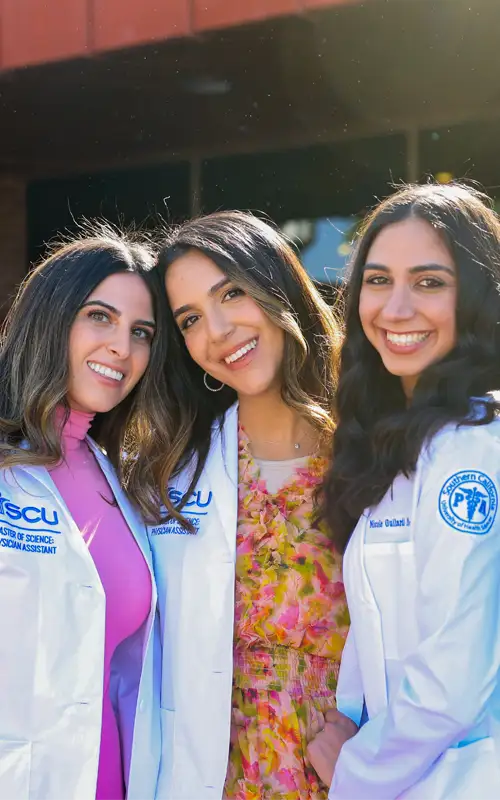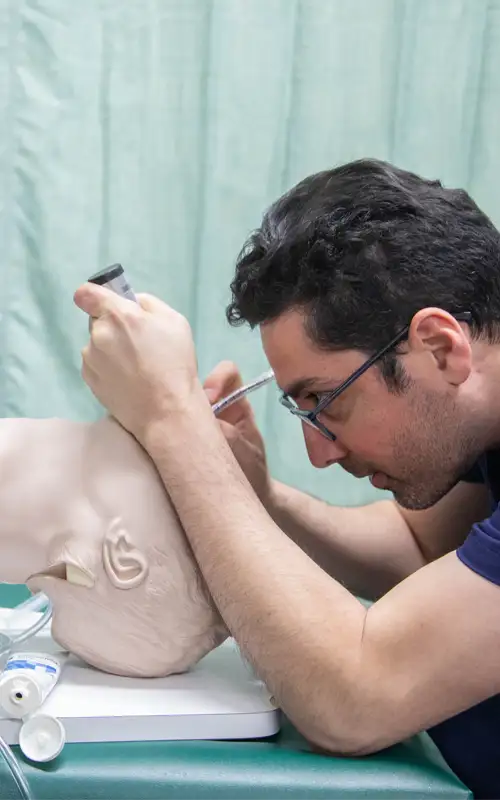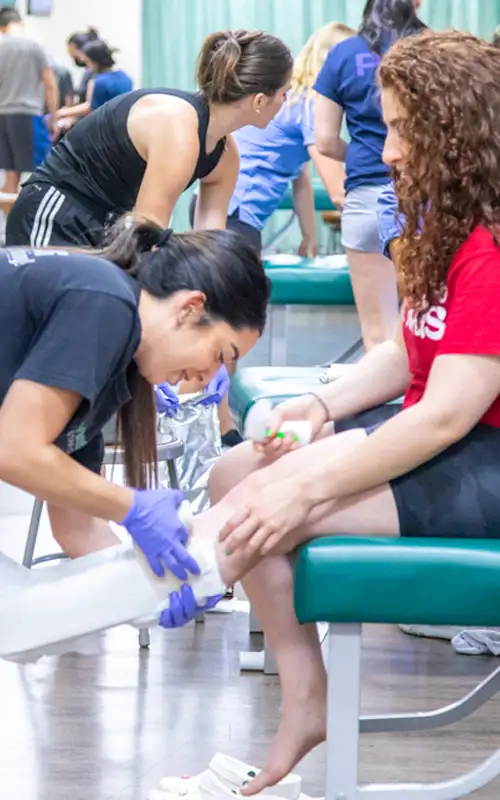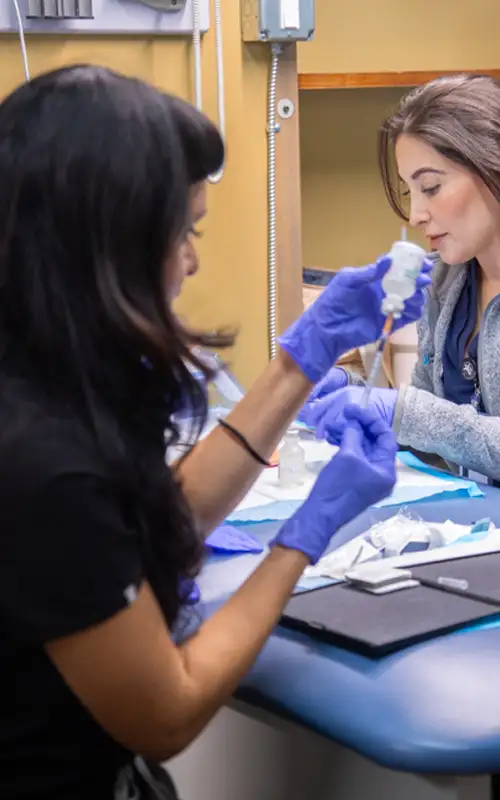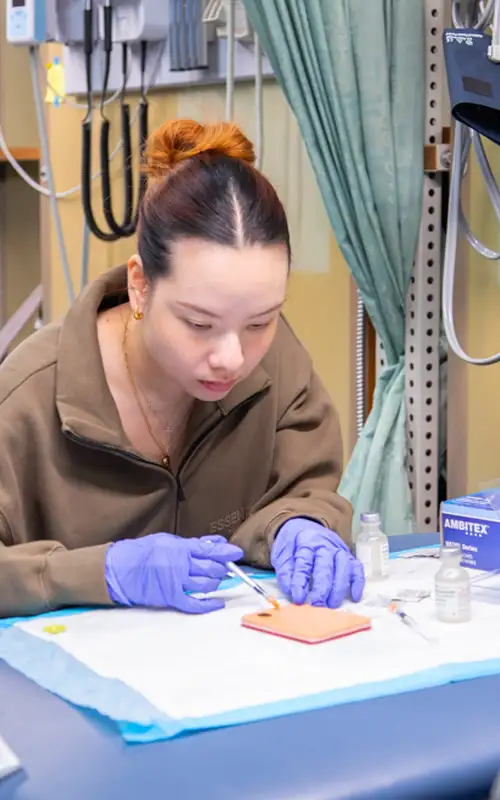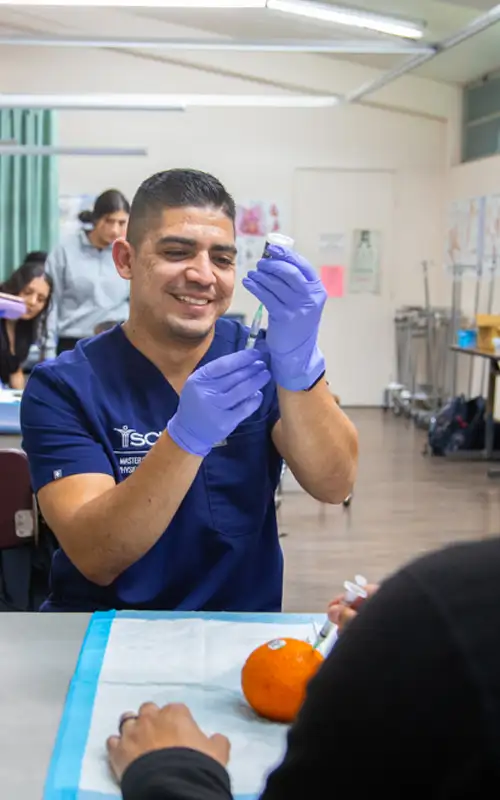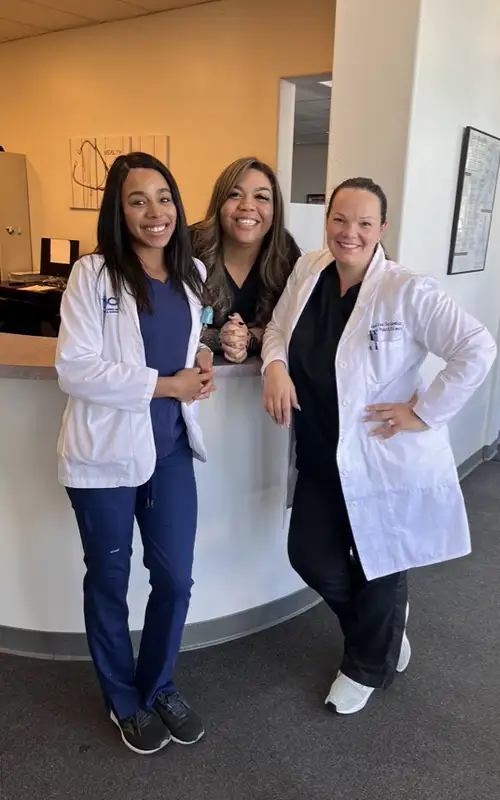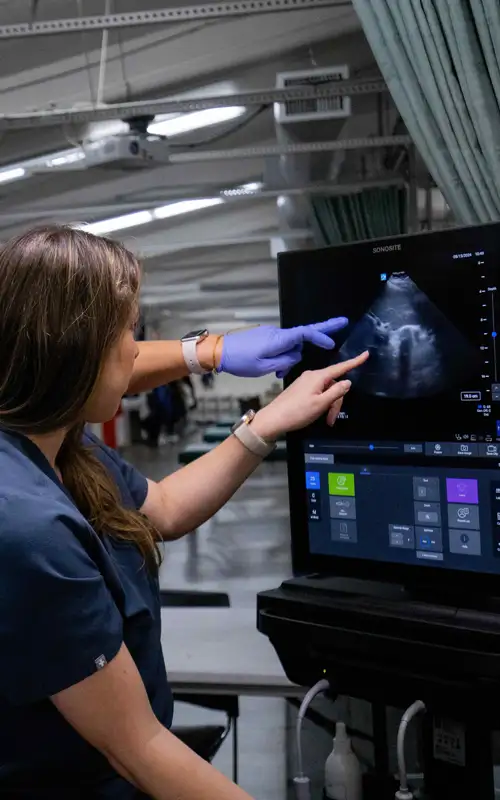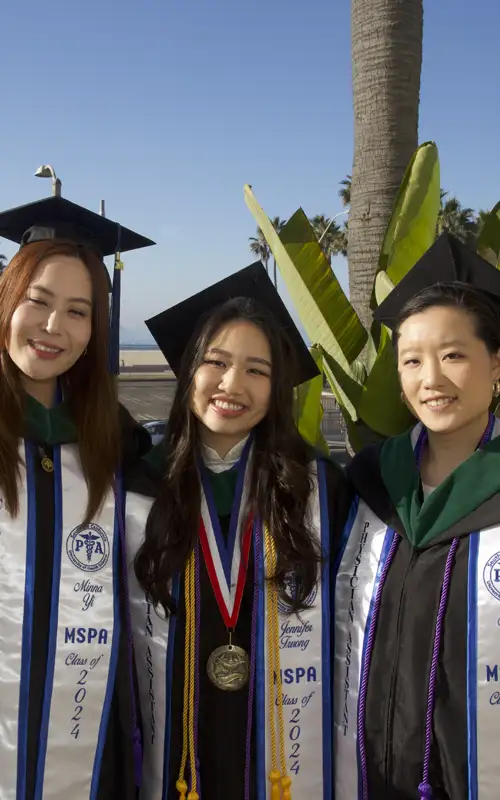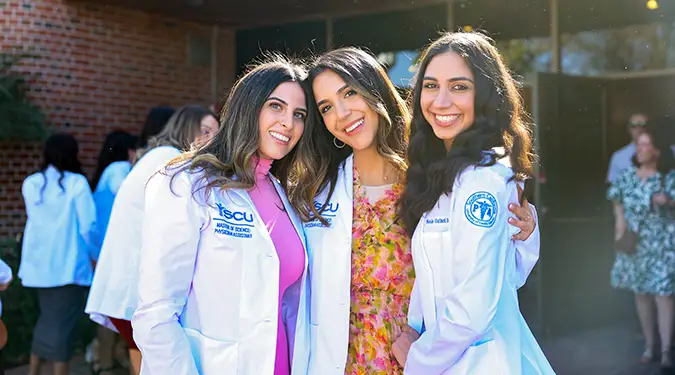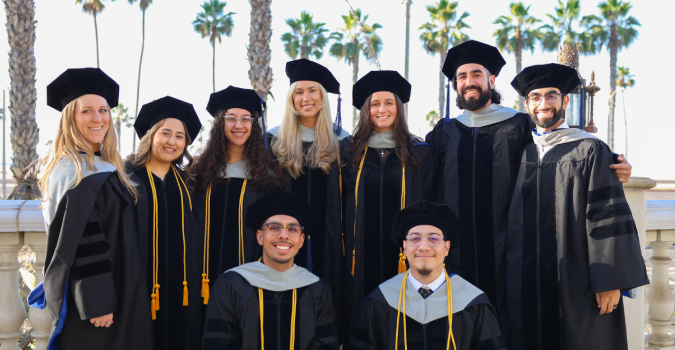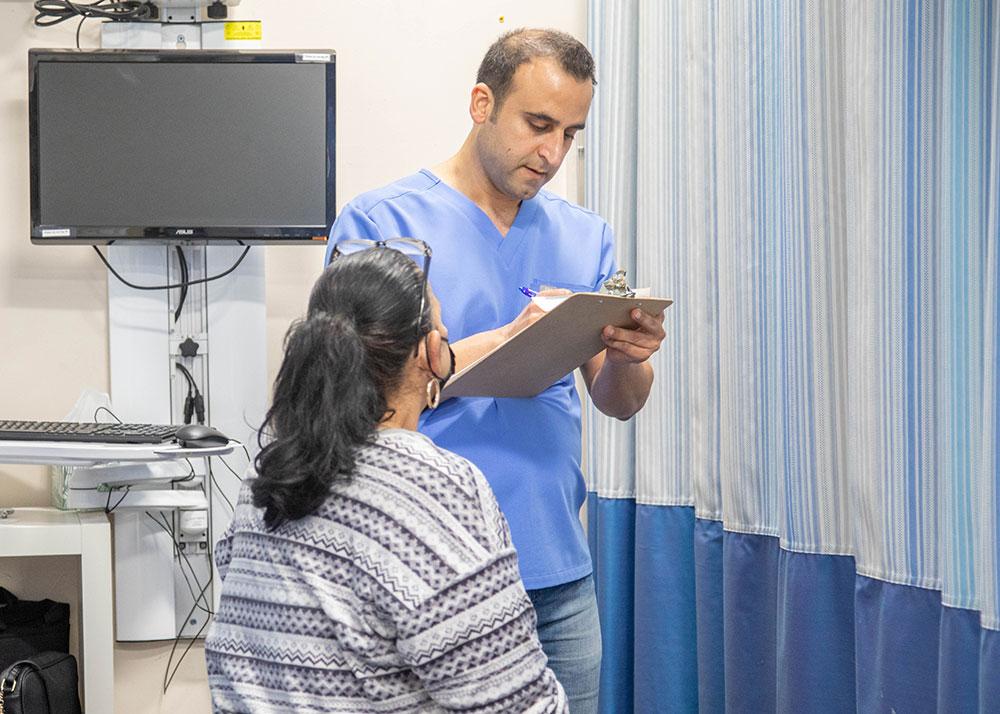Master of Science: Physician Assistant Program
Overview
Physician Assistants (PAs) are highly trained medical professionals who work under the supervision of licensed physicians to provide patient care. Nationally certified and state-licensed to practice and prescribe in all 50 states, the District of Columbia, and all U.S. territories, PAs perform a wide range of services such as diagnosing illnesses, prescribing medications, ordering and interpreting tests like X-rays or MRIs, performing procedures like suturing wounds or setting factures, and assisting in surgeries.
As our nation grapples with skyrocketing healthcare costs, an aging patient population, and a significant shortage of physicians, PAs have received expanded authority to help fill the gap. According to the U.S. Bureau of Labor Statistics (BLS), employment for PAs is projected to grow by 28% from 2023 to 2033—much faster than the average for all occupations. And with a median salary of $134,000 there has perhaps never been a better time to become a Physician Assistant (PA).
SCU’s leading-edge Master of Science: Physician Assistant program features a unique curriculum through which you will be introduced to both conventional as well as complementary approaches and will learn to treat the whole person (body, mind, and spirit). While our nation’s healthcare leaders call for a more integrative, whole-person approach to care, we’re one of the only healthcare colleges already teaching it.
Program at a Glance
- Full-time, online-hybrid program (2 years and 4 months)
- Includes live online lectures as well as in-person, hands-on training
- Extensive range of clinical rotations across diverse specialty areas
- Special program to bolster success on the Physician Assistant National Certifying Examination (PANCE)
- Accredited by the Accreditation Review Commission on Education for the Physician Assistant (ARC-PA)
- Prepares graduates to sit for the professional board exam given by the National Commission on Certification of Physician Assistants (NCCPA), and to apply for state licensure and for a Drug Enforcement Administration (DEA) certificate to prescribe controlled medication.
- Fixed tuition guarantee, federal financial aid for those who qualify.
Upcoming Start Dates
- Fall: September 2nd, 2025
Click the image above to view the Master of Science: Physician Assistant program in action.
What Sets Our Program Apart?
FLEXIBLE HYBRID FORMAT
As an SCU Physician Assistant student, you’ll enjoy a unique learning experience that combines the convenience of online learning with the power of in-person clinical training. During year one, you’ll attend live online lectures from the comfort of your home and come to campus 2-3 days per week for hands-on training. During year two, all of your learning will take place in-person as part of your required clinical rotations.
EXTENSIVE RANGE OF CLINICAL ROTATIONS
You’ll complete clinical rotations in a wide range of specialty areas, thanks to our broad network of clinical partners. These diverse training experiences will not only broaden your skills but help you discover what specific area of medicine you’d most like to work in after graduation.
You’ll complete Core Clinical Rotations in each of the following areas:
- Internal Medicine
- Pediatrics
- Family Medicine
- Women’s Health
- Surgery
- Behavioral and Mental Health
- Emergency Medicine
- Integrative Health
In addition, you’ll select two of the following Elective Rotations:
- Cardiology
- Dermatology
- Otolaryngology (ENT)
- Nephrology
- Orthopedics/Sports Medicine
- Neurosurgery
- Gastroenterology
- Hematology Oncology
- Radiation Oncology
- Pain Management
- Plastic Surgery
- Pediatric Neurology
- Oral Maxillofacial Surgery
- Home Health
- Cardiothoracic Surgery
- Endocrinology
- Interventional Radiology
- Pediatric Allergy/Immunology
- Critical Care
- Urgent Care
Learn more about each rotation.
TECHNOLOGY-ENHANCED LEARNING
In addition to classroom lessons and hands-on clinical training, we’ll support your learning through advanced teaching technology including:
- Complete Anatomy: Also known as 3D4 Medical, Complete Anatomy is a powerful simulated anatomy suite on which you can perform intricate tasks such as removing layers of tissue and visualizing details of the human body.
- SynDavers: These lifelike silicone structures replicate living human tissue and are designed to be ultra realistic, helping you better understand the human body as you move muscles and parts.
- Draw It to Know It (DITKI): This interactive tool is perhaps our most popular, featuring YouTube-style videos that include drawings, animations, and digital worksheets to help you more easily learn about physiology and successfully prepare for your licensure exams.
- Diagnostic Imaging Technology: You’ll learn to use advanced tools like X-rays, MRIs, CT scans, and more to “see” inside the body without surgery, for less invasive, earlier diagnosis.
CERTIFICATION EXAM SUPPORT
To further support your success, we developed our PANCE Preparedness Program to help prepare you for the Physician Assistant National Certifying Examination (PANCE). As a student, you’ll have access to a range of supports, including a customized report on your strengths and areas in need of improvement, a personal study plan, tutoring, practice questions, an NCCPA practice exam—plus ongoing mentorship up to the date of your exam.
SPECIAL RECOGNITION PROGRAM
Through our Professionalism Honors Program, you will have the opportunity to receive special recognition for maintaining exceptional professionalism throughout the duration of your program. Should you make the honor roll, you’ll be awarded a letter of acknowledgement from the Program Director, to present to prospective employers as evidence of your dedication and regard for professionalism in medicine.
UNIQUE INTERPROFESSIONAL EDUCATION.
Most of today’s healthcare colleges offer an “interprofessional education” through which students learn with, from, and about other disciplines. But at SCU, we do it differently. Unlike other colleges, we teach you about both conventional and complementary disciplines—not just one or the other—because we believe in both and we teach both, all under one roof.
AN INTEGRATIVE, WHOLE HEALTH APPROACH
All too often, healthcare providers “stay in their lanes” rather than building comprehensive care plans that include other disciplines, professionals, and approaches. In addition, they look strictly at the physical body as opposed to all the factors that may be influencing a patient’s health and well-being—genetics, lifestyle, mental health, relationships, physical environments, community support, and beyond. But at SCU, no matter what program you are in, you’ll learn to blend the best of conventional and complementary approaches (integrative healthcare) and to treat the entire mind, body, and spirit (whole health)—for true lasting wellness.
Program News
Admin2025-07-25T23:47:21+00:00December 18, 2024|

